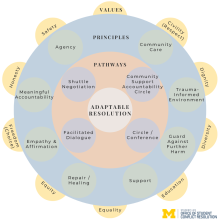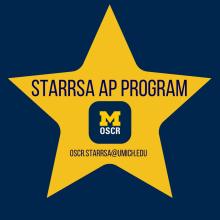Adaptable Resolution (AR) for Students is a voluntary and restorative process used to address harm within the community stemming from sexual and gender-based misconduct. Through shared-decision making and active engagement, Parties, alongside trained facilitators, are invited to engage in a spectrum of pathways designed to promote agency, equity, and collaboration. These pathways create opportunities for meaningful accountability, repair of harm, and education to prevent future harm.
The Sexual & Gender-based Misconduct (SGBM) Response Programs within the Office of Student Conflict Resolution include Adaptable Resolution (AR), STARRSA Active Psychoeducation (STARRSA AP), and Review & Reintegration (R & R).
The SGBM Programs are a key part of OSCR’s work to Build Trust, Promote Justice, and Teach Peace using restorative practices. We embody the philosophies and principles of restorative justice, social justice, and conflict transformation. Through our work in education and resolution, we apply a trauma-informed lens and emphasize strong cultural competence in seeking to effectively understand and support all participants, both on an individual and community level.
In all OSCR-SGBM Response programs, staff seek to uphold the following values:
- Civility (Respect): Create a space where difficult conversations and requests to meet needs and repair harm can be offered and heard without disrespect
- Dignity: Ensure all conversations are approached with a human-first perspective, that encompasses the multiple responsibilities we have to students as human beings and participants to ensure participants will have equitable buy-in and agency
- Diversity: Strive to hold space for students to share their experiences and the wealth of perspectives they bring to their behavior, learning, and goals and strive to create a brave space for students to explore additional perspectives and experiences as they relate to their behavior, learning, and goals
- Equity: Ensure that all conversations, education, and resources are tailored to and adaptable to the needs of each student and uphold integrity and fairness
- Equality: Ensure that students have access to all University resources available to them
- Education: Support students during their learning moments by providing them with a clear structure, learning content, and space to process with trained facilitators
- Freedom (Choice): Welcome student's freedom of expression to honor the collaborative nature of shared-decision making in all OSCR-SGBM Response programs
- Honesty: Ensure transparency in OSCR-SGBM Response processes, expectations, and responsibilities as Individuals with Reporting Obligations (IRO) and Campus Security Authorities (CSA)
- Safety: Strive to hold space for students to voice their experiences without judgment or scrutiny and support students in identifying appropriate resources for mental health, wellness, and personal development
STARRSA Active Psychoeducation
The Science-based Treatment, Accountability, and Risk Reduction for Sexual Assault (STARRSA) Active Psychoeducation (AP) is a program designed to address sexual harm in a college student population. The STARRSA AP Program utilizes a multi-modal, empirically informed approach to identify knowledge gaps related to risk factors and increase knowledge about protective factors of students who have engaged in sexual misconduct.
Review and Reintegration
The Review and Reintegration (R & R) program provides a pathway to a restorative return to campus for a student found responsible for sexual harm, supporting both the student and the campus community. Review and Reintegration utilizes Circles of Support and Accountability to offer space for students to reflect on learning, determine the appropriateness of lifting sanctions, identify resources and support for sustained success, and plan any additional measures needed to ensure successful reintegration into the community.


